Tim Walker's Blog, page 13
November 26, 2016
Positively Dickensian
On a bleak Black Friday, 25th November 2016, I ventured out from the warmth of my humble abode to attend the most delightful author talk, the subject being arguably one of the greatest writers in our English language, Mister Charles Dickens. The presentation, made in Slough’s newest space, a triumph of modern architecture, the Curve, was delivered with enthusiasm by historian Lucinda Hawksley, a great-great-great granddaughter of the man himself. She had come to share with us her new biography of her illustrious ancestor, ‘Charles Dickens and his Circle.’
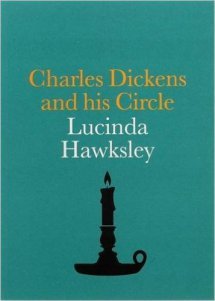 Her connection to this great literary figure made for an intriguingly personal approach in offering an insight into the life, loves, motivations and achievements of this extraordinary man, told through his associations and friendships with other celebrity figures of the Victorian Age. Indeed, a member of the audience remarked on a perceived family likeness, as she stood next to a portrait of the 27-year-old Dickens by artist Daniel Maclise. This was the first of many portraits shown of Dickens (with a growing beard over his lifetime) and other notable Victorians. Some are paintings housed in the National Portrait Gallery in London (the publishers of this book) and others, illustrations and photographs.
Her connection to this great literary figure made for an intriguingly personal approach in offering an insight into the life, loves, motivations and achievements of this extraordinary man, told through his associations and friendships with other celebrity figures of the Victorian Age. Indeed, a member of the audience remarked on a perceived family likeness, as she stood next to a portrait of the 27-year-old Dickens by artist Daniel Maclise. This was the first of many portraits shown of Dickens (with a growing beard over his lifetime) and other notable Victorians. Some are paintings housed in the National Portrait Gallery in London (the publishers of this book) and others, illustrations and photographs.
Lucinda’s book includes portraits of the key figures in Dickens’ life, both family and friends that made for a good slide show, conveying a feel for the time as she delicately exposed the key moments of his life for us to get a sense of the man. She told us that his early childhood in Portsmouth was a happy time, with his carefree parents creating an atmosphere of kindness, love and playfulness in a tiny terraced house (still standing as a museum).
Things changed for the worse when the family moved to the urban squalor of London. Soon his parents got into debt and ended up in Debtor’s Prison. In fact the whole family were interred, and the young Charles, then 12 years old, was sent out to work to earn enough to cover the family’s costs. His first job was working in a shoe polish factory on the Strand, and he would walk there and back from his one room lodgings in Camden Town each day.
This wretched end to his happy childhood deeply affected Charles, but being of strong character, he battled through and helped his family out of debt, eventually progressing to a better job as a solicitor’s clerk. He began to follow his heart’s desire to be a reporter by going ‘freelance’ and selling news reports to various publications. Newspapers and magazines abounded in Victorian London, and he soon established a reputation under his pen name ‘Boz’, going on to serialise what was to become his first novel, The Pickwick Papers, in a magazine. Much later, he finally dared to write about a family who were subjected to the shame and social censure of being sent to the Debtors Prison in Little Dorrit, a subject that haunted him through his life, given the trials of his parents.
Lucinda describes his struggles to achieve his dream of becoming a writer, and the crossover from journalism to fiction writing, through which Dickens could convey his observations and experiences of life in Victorian London. Various characters entered his life, the first being his wife, Catherine. She was the daughter of his newspaper editor, and is described as being from a well-off middle class family, and a cut above the ambitious but impoverished Charles. Together they had ten children, nine surviving to adulthood (kicking the trend of only one in three children becoming adults in Victorian times). During the course of their marriage he was transformed from an unknown journalist to a famous novelist.
Indeed, the rigours of poverty in industrial Britain were an ever-present theme in Dickens’s writing, and he spent much of his time campaigning for social justice and improvements for the poor. Lucinda presents us with an array of celebrity friends and associates of the Dickens family – fellow writers and artists, philanthropists and business associates, painting a picture of the celebrity culture of the day. He went on book promotion and reading tours, engaging with his readers, which has earned him the reputation as the first ‘modern’ author. He also fought for copyright law, as his works were mercilessly bootlegged, robbing him of income.
Once he became famous, he joined the literary set in London, mixing with the likes of William Makepeace Thackeray, Oscar Wilde, George Bernard Shaw, Alfred Lord Tennyson, Thomas Carlyle, Elizabeth Barrett Browning and Mary Ann Evans (George Eliot). Illustrators and artists abounded, including JMW Turner, and Hans Christian Anderson was their house guest. Philanthropists and radicals, royalty and musicians could all be found at their parties. He was greeted with the fervour of a pop star on his visits to the United States of America, where he befriended Edgar Allan Poe, William Wadsworth Longfellow and Washington Irving.
Lucinda described some of the more poignant moments of his life, including when he left Catherine for his mistress, Ellen Ternan. Dickens barely survived a devastating train crash in Kent that left him physically and emotionally scarred. He had pulled Ellen and her mother out of their crushed carriage and was lauded for helping the wounded and dying. He died exactly five years to the day after this awful event, in 1870 at the age of 57.
These were some of the fascinating insights into the life of Charles Dickens laid before us as the often stern faces of the Victorian greats and Dickens’ family members were flashed on the screen. I procured a signed copy and started reading the book as soon as I got home.
Charles Dickens and his Circle, by Lucinda Hawksley, published by The National Portraits Gallery Publications, 2016.


November 15, 2016
Heartwarming Christmas Anthology
I’m thrilled and honoured to have my holiday story, El Dorado, featured in this soon-to-be bestseller! Holiday Heartwarmers came together after a shout-out to authors from around the World in a FaceBook Author Group, and the fifteen ‘best’ stories, set at Christmas time, were selected by Editor, Sunanda Chatterjee.

Immerse yourself in this eclectic collection of short stories featuring authors from around the world. Travel to different places with them as they enjoy an unexpected journey back home to reunite with family and take a chartered flight to the North Pole. Shiver with the cold and anxiety as their loved ones get stranded in a snow storm in Alaska or share the amazement of gazing at the spectacular views during a hike to Machu Picchu. Explore the Indian subcontinent by train, share an unforgettable vacation in Cyprus or venture into Afghanistan in the midst of war.
Holidays are a time of sharing and can take many forms. These stories explore the issues of family dynamics, reflections on life, and finding the true meaning of love and acceptance. They also show that sometimes, it is just as important to let go of old feelings and old memories.
This collection of short stories is sure to warm your heart and light the spirit of Christmas


October 31, 2016
Halloween… the Day of the Dead
To celebrate Halloween I’ve discounted my spooky thriller, Devil Gate Dawn, to just 99p/99c. if you download, please message me and I’ll send you a FREE pdf copy of my short story, ‘Halloween 50BC’.
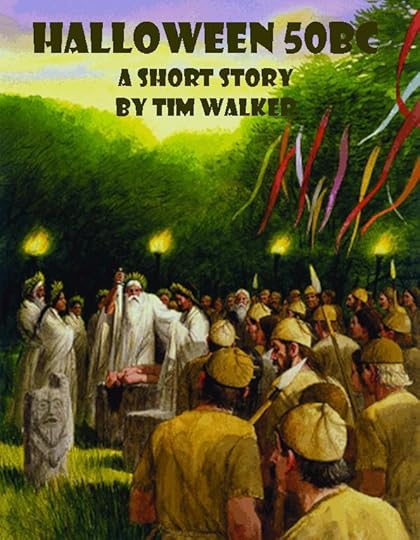
Halloween History
Straddling the line between autumn and winter, plenty and paucity, life and death, Halloween is a time of celebration and superstition. It is thought to have originated with the ancient Celtic festival of Sah-wen, when people would light bonfires and wear costumes to ward off roaming ghosts.
In the eighth century, Pope Gregory III designated November 1st and 2nd as a time to honour all saints and martyrs; the twin holidays, All Saints’ Day, followed by All Souls Day, incorporated some of the traditions of Sah-wen. The evening before was known as All Hallows’ Eve and later Halloween.
Over time, Halloween evolved into a secular, community-based event characterised by child-friendly activities such as trick-or-treating. In a number of countries around the world, as the days grow shorter and the nights get colder, people continue to usher in the winter season with gatherings, costumes and sweet treats.


October 26, 2016
The Politics of Big Business
It’s 26th October 2016 and in today’s news (in the UK) is the announcement that the British Government has backed the proposal to expand Heathrow Airport by building another runway. This is despite protests from the hundreds of thousands of local resident in this densely populated area west of London, and over one million people signing a petition saying NO to a new runway. Already the air is dangerously polluted, and residents on the flight path (including myself) suffer from poor air quality. Once again, the interests of Big Business trump those of citizens, in our pro-capitalism sham democracy.
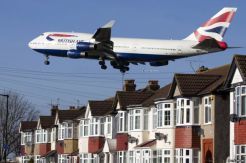
Prime Minister, Theresa May, said the decision shows her government is ready, “to take the big decisions when they are right for Britain.” Right for whom, exactly? Not for the residents and the million plus protestors, and not for her constituents in Maidenhead, also on the Heathrow flight path, whose protests she was supporting before her swift elevation to party leader. Why are they continuing to invest in the already overcrowded south east of England and not in the Midlands or North? They are crying out for investment, whereas residents in the South East are crying out for more space and breathable air.
Add this decision to the many others since the time of Margaret Thatcher that have asset stripped and weakened our country in the name of privatisation and personal wealth accumulation for a tiny minority of international capitalists, and, bizarrely, foreign governments. Our public transport and utilities sectors, owned mainly by international companies, are amongst the most expensive in Europe, as ‘consumers’ pay over the odds for shareholder dividends and senior executive bonuses. Our small manufacturing sector is dominated for foreign multi-nationals, many of whom reject our country’s democratic decision to leave the European Union and now threaten to punish us by leaving. The stock markets and money markets are already punishing us for making the ‘wrong’ decision, thus demonstrating our collective weakness to choose our own path when held in the tightening grip of the forces of capitalism.
In Britain, it seems that regardless of which political party is in power, the net outcome is the same – the soft left government of Labour under Tony Blair and Gordon Brown delivered the deregulation of the financial sector that ultimately led to cowboy trading and the big crash of 2008. Neither Labour nor the Conservative Party can be trusted to act in the interests of citizens over Big Business. We are simply witnessing the latest in a long line of decisions aimed at making a tiny minority of already wealthy people even wealthier. This is the philosophy at the heart of our bankrupt political system. I will soon need my own oxygen supply just to survive living close to Heathrow. Perhaps Prime Minister May can recommend a competitive international supplier?
If you want to share my insight into what Britain and the USA will be like in ten years time, then please click the link below, download and read my novel, Devil Gate Dawn, currently discounted to just 99p/99c…



September 1, 2016
Who Can We Trust?
Recent media reports highlighted the worrying hold China has over the UK, after our government allowed it to become the North Sea’s top oil operator. The communist-controlled China National Offshore Oil Corporation (CNOOC) now runs two of our biggest oil fields, producing over 200,000 barrels of oil a day.
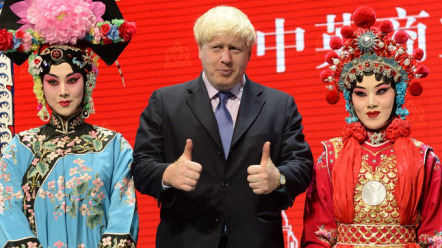 This hold gives China leverage in negotiations with the UK Government, significantly weakening our control over our own energy sector. Imagine what would happen if the Chinese were permitted to build and run a nuclear power plant in the UK, as is currently proposed? Meanwhile, new Foreign Secretary, comedian Boris Johnson, has flow to Beijing to confound the Chinese with his buffoonery and buy time whilst the new post-Brexit administration works out what to do next.
This hold gives China leverage in negotiations with the UK Government, significantly weakening our control over our own energy sector. Imagine what would happen if the Chinese were permitted to build and run a nuclear power plant in the UK, as is currently proposed? Meanwhile, new Foreign Secretary, comedian Boris Johnson, has flow to Beijing to confound the Chinese with his buffoonery and buy time whilst the new post-Brexit administration works out what to do next.
For the British people, robbed of national assets through privatisation, the future looks bleak, as foreign governments, often hiding behind state-owned corporations, buy into our manufacturing, energy, transport and other key economic sectors. Globalisation has done for us. We have been asset-stripped and left powerless in negotiations with foreign governments, whilst our ruling elite have salted away fortunes in offshore bank accounts. Is this really the country we want for our children?
Despite having a democratic system of governance, we seem powerless to make our political leaders turn away from the dark forces of global capitalism and prioritise citizen-focused issues. Witness the London property market – locals have been priced out as it has been turned into a money haven for foreign ‘investors’. We seem doomed to be patronised by the Westminster elite, doing the bidding of the super rich – hypocrites who are busy selling our country to feather their own nests. They believe everyone is like them – obsessed with position and personal wealth accumulation.
Well, I have news for you. Other nationalities have different perspectives and priorities, and in the case of the Chinese Government, it is to obtain ownership (through State-owned companies) of as much of the World’s mineral assets as possible. To them, cash and barter of goods and services is a way to secure mining rights around the world, starting with developing countries. This gives them both raw materials for their industry and political leverage that increases their power and influence. They now have their eyes on Europe.
I’m sure the Chinese hierarchy look with amusement at the behaviour of BoJo the Clown and our other hypocritical political leaders who are self-obsessed and care little for the ‘good of the people’. At least this last part chimes with the Chinese who see labour as a resource to be exploited. Understanding this makes it easier for them to flatter and deceive our callow politicians into doing their bidding.
A report published in the mirror.co.uk on 24/08/16 talks about the Chinese using the positioning of oil rigs as ‘strategic weapons’, their rigs in a disputed area of the South China Sea described as ‘mobile national territory’. For this reason the USA has moved to protect itself from Chinese ambition by blocking the sale of oil wells over security fears. Paranoid or justified? Meanwhile, the UK Government handed £2 billion in tax breaks to the CNOOC in 2015. Oh, and by-the-way, General Nuclear Power, the Chinese state-owned corporation and the proposed partner in the UK’s £18 billion Hinckley Point project, is facing industrial espionage charges in the US.
The ‘investment’ of foreign governments, through state-owned corporations (including France’s EDF) must surely be a concern for the country. In China’s case, it is a calculated bid to control energy generation in Britain to give them a power base – a toe-hold in negotiations with a weakened British Government. Why would an elected British Government even contemplate such a deal? Surely they have been put there by the British people to represent their collective interest?
Not a bit of it. Global business interest thinly disguised as investment dictates our political agenda, and what is in the best interests of the country is relegated to a minor concern, tersely dismissed by our high-handed moralising politicians. Will the British people really see the benefits of fracking for shale gas? I think not – the gas extracted by private companies will be sold to the highest bidder on the global energy market. We will have our countryside torn up to simply create wealth for a small elite, and still be paying through the nose for our gas supply. That’s how it works.
All was going well for the Establishment until the unexpected Brexit vote. The British electorate took umbrage at being patronised and instructed to Vote Remain. They exercised the one bit of freedom they had left – the choice to vote against the hated money-obsessed Establishment and their Westminster-based toady politicians. It was an embarrassing setback for the forces of Globalisation, but they have quickly re-grouped under a new Conservative Prime Minister, one with worrying similarities to Margaret Thatcher, who set the ball rolling on selling off our national assets some thirty years ago.
Has new Prime Minister, Theresa May, been given her instructions to return the country to a Victorian era voting system by removing those who are not property owners from the electoral register? This would ensure no more disturbances from a peeved electorate to their capitalist agenda, and match nicely their plans to remove the Welfare State and its prize jewel, The National Health Service, tossing the welfare of the poor, sick and disabled into the arms of the charity sector. It’s not as crazy an idea as you might think. The soon-to-be-debated repeal of the Human Rights Act is just another attempt to strip us of our rights and return the country to an authoritarian system based on patronage.
At least we should be able to see the Chinese coming and veer away from their proposed ‘investments’. However, our biggest danger remains the behaviour of our own Government. How can we escape them?


August 26, 2016
Changes Made to Futuristic Novel
I’ve taken on board some useful feedback following the release of my first novel, Devil Gate Dawn, in April 2016, and as a result have made a few changes:
The cover has been changed to have a shadow figure standing at the gate
The quote on the front has been changed to, ‘Mild-mannered George must face his nemesis’
The start of chapter one now has George reflecting on an accident at work, indicating that such traumatic moments contributed to his decision to take early retirement. Other work-related inner thoughts have been added through the early chapters, showing he is still haunted by past events. These reflections stop when new events come to dominate his thoughts and actions.
 All in all, I’m proud of my achievement in pasting together this story from blogs and new material, and am thankful for the input of my copyeditor, Sinead Fitzgibbon, in helping to shape it into a structured story with sub-plots and suitably developed support characters.
All in all, I’m proud of my achievement in pasting together this story from blogs and new material, and am thankful for the input of my copyeditor, Sinead Fitzgibbon, in helping to shape it into a structured story with sub-plots and suitably developed support characters.
George battles his way through problems with a calm, stoic approach, often bewildered by the extreme methods and actions of others. In many ways, his pragmatic approach has mirrored my own problems with battling health issues whilst writing it.
I’ve made notes for a follow-up, and have pored over the 10,000 words of my abandoned novel, The Langley Leopard (submitted to the Richard and Judy novel competition three years ago!) that preceded this one, looking to salvage bits.
I’ve temporarily dropped the price to 99p and equivalent in other currencies to attract new readers.
In the meantime, I’m immersed in the mid-fifth century, ploughing on with researching and writing my next historical fiction novel, Ambrosius: Last of the Romans.


August 24, 2016
Are You a Psycho?
Are you extremely self-confident, egocentric, charming and fearless? Do you lack empathy for your fellow humans? Are you employed in one of the following positions or professions?
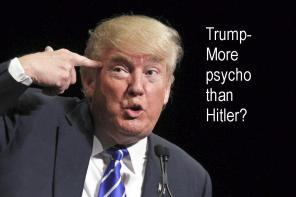 Chief Executive Officer (CEO); Lawyer; Broadcast Media Professional; Salesperson; Surgeon; Journalist; Police Officer; Clergyperson; Chef; Civil Servant.
Chief Executive Officer (CEO); Lawyer; Broadcast Media Professional; Salesperson; Surgeon; Journalist; Police Officer; Clergyperson; Chef; Civil Servant.
These are the top ten most likely jobs for people with psychopathic tendencies, according to the ‘Great British Good Psychopath Survey’, run by Kevin Dutton, a psychologist at Oxford University’s Department of Experimental Psychology.
You’ll never look at your vicar/priest/pastor in the same way again, nor that calm, smiling police office. Okay, we’ve known for years that business leaders, top chefs and TV presenters are psychos, but civil servants, surgeons and religious leaders?
The survey report points out that although people with psychopathic tendencies are drawn to high-paying power jobs such as CEO and lawyer, their difficult personalities may hold them back from succeeding. Their out of work life may prove problematic, as their ‘difficult’ personality traits will put them at odds with others.
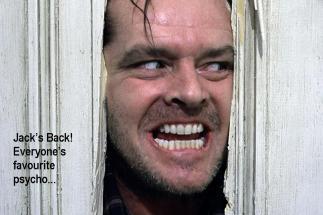 Why not take the test below (as featured in the mirror.co.uk recently) to see where you are on the psychopath spectrum? Reporters have been having fun with this, recently declaring that Donald Trump has a higher score on the scale than Adolph Hitler! (how Hitler answered from beyond the grave is not disclosed).
Why not take the test below (as featured in the mirror.co.uk recently) to see where you are on the psychopath spectrum? Reporters have been having fun with this, recently declaring that Donald Trump has a higher score on the scale than Adolph Hitler! (how Hitler answered from beyond the grave is not disclosed).
Answer these eleven questions as honestly as you can, count up your points, and post a message below with your score:
For each question award the following points:
0 = Strongly disagree
1 = Disagree
2 = Agree
3= Strongly Agree
I rarely plan ahead. I’m a spur-of-the-moment kind of person.
Cheating on your partner is okay, as long as you don’t get caught.
If something better comes along it’s okay to cancel a long-standing appointment.
Seeing an animal injured or in pain doesn’t both me in the slightest.
Driving fast cars, riding rollercoasters and skydiving appeal to me.
It doesn’t matter to me if I have to step on other people to get what I want.
I’m very persuasive. I have a talent for getting other people to do what I want.
I’d be good in a dangerous job because I can make my mind up quickly.
I find it easy to keep it together when others are cracking under pressure.
If you’re able to con someone, that’s their problem. They deserve it.
Most of the time when things go wrong it’s somebody else’s fault, not mine.
How did you rate? 0-10 points means you have few psychopathic tendencies, and are a warm, cuddly, empathetic person with a conscience and sense of social responsibility.
11-21 You have a conscience, but have a pragmatic streak and generally aren’t afraid to do your own dirty work. You’re neither a shrinking violet not a pushover.
22-31 Right or wrong isn’t as important as getting the job done. You know what you want and go for it, even if it means bending the rules and putting some noses out of joint. Nothing fazes you. You are decisive and self-confident.
 32-33 You’re at the top of the spectrum, a total psycho.
32-33 You’re at the top of the spectrum, a total psycho.
How did I do? I came in the 11-21 category – I’m an empathetic pragmatist. I can get things done, but not by stepping on others…


July 25, 2016
Sir Greed and the Knights of Exploitation
Sir Greed banged his fist on the round table, “Bring me truffles!” he thundered, as the serving staff in BHS livery went scurrying. “’Tis treachery! The May Queen talks softly of helping the poor, yet it is the avowed intent of this fair kingdom to crush their will and keep them in grinding poverty, lest they get ideas and organise resistance!”
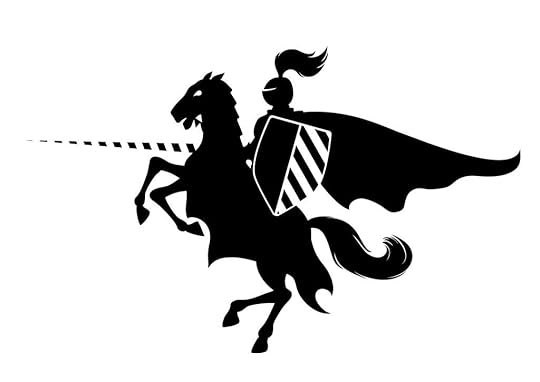 Sir Greed rode out on his black stallion
Sir Greed rode out on his black stallionHe rode out of Castle Green at the head of his personal escort and made his way to the commission of poor men to give evidence for his alleged misdeeds. His squire, a mean and indolent fellow called Chappell, rode beside him.
“Chappell, heed my words. These villains will ask why I favoured thee with half my lands, to which you must reply, ‘My Lord put me in charge of the upkeep of the serfs in good faith, but I lacked the knowledge of my wise master to manage the estates and provide for their welfare’. Got it?”
“Yes, my Lord. And I shall remain in your favour by not mentioning that you stripped the silver and gold from all the holy places to pay for your new royal yacht.” Sir Greed glared at his snivelling underling, knowing full well that his deviousness and avarice had bound him to the villain.
“Look, my Lord! The May Queen awaits you before the humble parliament shed.”
“Good day, my Queen, to what do I owe this pleasure?” The portly knight said, quivering in his saddle as he attempted an ungainly bow.
“It is no pleasure of mine, Sir Greed! I have come to warn you not to mock my councillors and give truthful evidence, for I intend to reform this kingdom and reverse the culture of theft and oppression that has become your hallmark.”
“My Queen, I will doff my cap and tell them what they want to hear, but we both know your kingdom is based on a wealthy elite exploiting the serfs for personal gain, aggrandisement and displays of riches. For every rich man, there must be hundreds of serfs to support him, working his fields for a pittance, fighting his battles, and being grateful for a rat-infested hovel to live in and a handful of grain to feed his lice-ridden family.”
The May Queen eyed him with a cold, well-practiced withering look, and answered in a low and threatening voice. “That may be how we want it, Sir Greed, but we must at least make a show of appearing to care for the welfare of the legions of poor, for without their labour, our kingdom would falter and we would not be able to continue our lavish lifestyles… beware the dangers of arrogance and cruelty! They have been the undoing of many Lords, and I will move swiftly to strip you of your titles if you do not play along with our mocking game of deception and false hope for our minions!”
Sir Greed, suitably chastised, went before the commission, and smiled like a devious crook as he rebuffed charges of dishonesty, avarice, and cruelty to his people. For in truth, the commission had no powers to strip away his lands or titles, merely the power to chastise and humbly request some coins for the alms box.
Sir Greed and Squire Chappell rode away, laughing at the powerless rage and frustration of the councillors, and dismissing the paltry amount paid into the alms box.
“We shall recover our outlay with higher taxes, my Lord,” the heartless squire quipped.
As they rode through a dark, foreboding forest, making their way slowly under overhanging trees, their path was suddenly blocked by a band of outlaws.
“Out of our way, vermin,” Sir Greed demanded.
The leader of the group, an ageing man with a grey scaggy beard, approached on a mangy nag. “My Lord, I am The Corbineer, leader of, well, one of a number of bands of outlaws in this forest, having been duly elected by my peers, and I must now ask you for your purse, as we have many mouths to feed.” He waved a short, bent sword, and encouraged his men to laugh at his boldness.
“Out of my way, scum!” Sir Greed replied, spurring his horse forward and brushing aside the dandy bandit. He rode away on his black charger, closely followed by his whimpering squire. They soon cleared the forest and turned back to see their entourage beaten and stripped of their clothing.
“Shall we ride back to aid our followers, my lord?” the panting Chappell enquired, feigning bravery.
“No need,” Sir Greed replied, “There are plenty more where they came from. I shall send a group of knights from the Order of The Exploiters to deal with this troublesome Corbineer. The poor are too divided with their village rivalries to come to his aid. We will not kill him but instead capture him and keep him in our Palace of Westminster as an example to others of how hope of advancement is in vain and they must accept their subservient position in our kingdom. As my Uncle Avarice once said, ‘It’s their hope that kills ‘em’.”
They laughed as they rode to Castle Green, oblivious to the cries and screams of their abandoned followers, safe in the knowledge that order had been upheld in the Kingdom of Fear.
To find out about the future of the Kingdom of Fear…
http://amazon.co.uk/dp/B01EGDLHLW


July 3, 2016
Post-Brexit Blues
One week on from the shock of the Leave Vote winning the EU In/Out Referendum, and the country is still reeling in a state of fury, dismay, confusion, denial and regret. There have been marches and protests against the result – one might say, against democracy itself. Instead of sulking over the drop in the value of their shares and properties, the well-off should spare a thought for the deep seething discontent in the country, and realise that our current political system has created this and continues to fuel it. 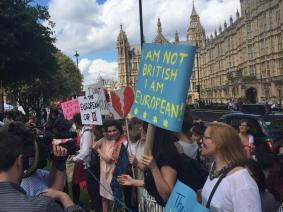
Our political leadership has been exposed as lightweight and not up to the job of leading us out of this mess. Opportunistic politicians have chosen instead to plunge the knife into rivals with personal ambition uppermost in their minds. We were not prepared for a Leave Vote because the Conservative Party in government were busy assuring international partners that they would succeed in threatening and bullying the electorate into voting Remain. They failed, and now stand like rabbits caught in the headlights of a runaway truck, careering madly across the cultural, social and political landscape.
“Rarely if ever in our lifetimes has Britain faced such an uncertain and unpredictable future. Rarely have the main parties at Westminster been, simultaneously, in such chaotic disarray. Who can recall a time when such a large section of the public, and not only the 48% who voted Remain, was in a state of such furious anger, confusion, denial, regret or heartfelt dismay?” The Observer (03/07/16). We could fight them on the beaches, but who should we fight? And who are we, anyway?
Personally, I feel the country should accept the outcome of the referendum and get behind a settlement for the nation so we can move forward. This settlement must include listening to the voices of those who voted Leave, many voices of protest from those who feel a deep rooted resentment against the London-based ruling elite, who carry on their merry way, regardless of which party is in power, with their capitalist agenda, marginalising and patronising those who get in their way.
The Conservative Party has opened Pandora’s Box and must now be ruing their miscalculation in believing they could manipulate the outcome of the referendum to come down on the side of political and economic stability – the side that would allow the preservation of the status quo and the continuation of the damaging policies of divide and rule. Vote Remain was seen as good for business, despite the fact that many see the EU as an undemocratic organisation in the process of morphing into a Federal Superstate. Their political objects are not ours, and so a Leave Vote appealed to many in the UK – 52%, in fact.
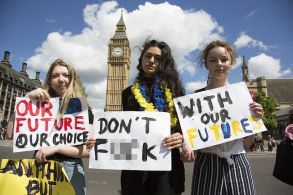 However, as a result of the vote, we find ourselves at a social.political and cultural crossroads, and need to ask ourselves the question, ‘Who are we?’ A national debate on who we are and what society we want to live in should be fired up, to curtail the forces of greed, nationalism, xenophobia and division who lurk in the wings waiting for their moment.
However, as a result of the vote, we find ourselves at a social.political and cultural crossroads, and need to ask ourselves the question, ‘Who are we?’ A national debate on who we are and what society we want to live in should be fired up, to curtail the forces of greed, nationalism, xenophobia and division who lurk in the wings waiting for their moment.
The main problem I foresee is our lack of leadership, as our two main political parties are riven with infighting and hopelessly ill-equipped to address the fundamental divisions in our fractured society. The Labour Party, having shuffled to the centre ground of British politics, is now disconnected from the core working class, and have become accomplices to the seemingly irresistible forces of ‘free market economics’, ‘International Capitalism’ or simply, ‘Thatcherism’, take your pick.
The mass influx of cheaper labour to feed the machine has caused widespread discontent, as British citizens have been told to ‘shut up and get on with it’. Well now they have had their chance to protest, via the In/Out referendum, and have chosen to stick two fingers up to the Establishment, and the sham democracy that leaves them as powerless serfs in an age of greed.
Can the Labour Party shake itself out of its torpor? What of the Green Party? They should get together and start a national movement for change. Citizens Against Capitalism. For starters, school leavers should be given clear guidance and training to do the jobs required, and we should focus more on producing what we consume. Let the business community find new markets through the world wide web – are trade deals even relevant anymore? Some fresh thinking is required, but can we find the leaders needed to drive the process?
In my near-future novel, Devil Gate Dawn, set just 10 years from now, I predict increasing divisions in British society following Brexit, that leads to a mass General Election boycott, followed by a Government of National Unity headed by King Charles. It was complete fantasy just two weeks ago, but now has been described as ‘increasingly believable’. My everyman hero, George, gets dragged into helping the police track down a deadly terror group, as they are forced to flee their homes and hide in the countryside… let’s hope it won’t come to this.
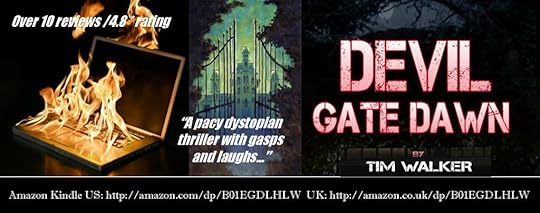
UK: http://amazon.co.uk/dp/B01EGDLHLW
USA/World: http://amazon.com/dp/B01EGDLHLW


June 26, 2016
Live Aid Remembered
Review: The Vinyl Frontier Show; Live Aid Organiser, Pete Smith, interviewed by Jeff Lloyd.
Venue: Nordern Farm Arts Centre, Maidenhead, on Saturday 25th June 2016.
Where were you on 13th July 1985? Those of us old enough to have witnessed the world’s most incredible concert will never forget the superb, unselfish performances and tear-jerking emotional pleas of Bob Geldof to ‘give us yer f**king money’. It was a momentous cultural event, a huge technological achievement and the World’s greatest ever charity fundraiser.

But who organised it all? Vinyl Frontier’s Jeff Lloyd, had met the man who organised Live Aid, Pete Smith, at BBC Radio Berkshire. As he lives close by, in Henley, he agreed to come along and be interviewed in front of a small audience, with Jeff playing memorable songs from Live Aid on vinyl records, whilst showing video footage on a screen. This format worked well, with Pete Smith telling his anecdotes between songs, bringing the whole event to life, and, by the way, plugging his soon-to-be-published book on his memories of organising Live Aid, Just the Ticket.
So who is Pete Smith and why have we never heard of him? It was Bob Geldof and Midge Ure, right? Well, it all started with Bob and Midge… The success of the previous Christmas’s Band Aid single, Do They Know it’s Christmas? had led to speculation about a possible live event. Once Bob had the idea in his head, he sought out the world’s leading music promoter, Harvey Goldsmith, in his office in central London. Harvey cautiously endorsed the idea, saying he would oversee it but would need to find someone to personally manage an event involving so many acts in a short space of time.
Pete Smith’s name was floated in a brain-storming meeting, as he was a promoter well-known throughout the music industry, someone who would have the stature and authority to call on the world’s leading music acts, and be able to co-ordinate a tight schedule with some of the world’s biggest egos and most difficult managers. Oh, and his wife worked for Goldsmith and floated his name in the meeting! In the days before mobile phones and computers, and with many acts touring around the world or simply inactive, this was a logistical nightmare. He was formally employed by the Band Aid Trust, and was the only salaried employee, on a six week deal.
Pete described some of the calls he made to hotels around the world, and the diplomacy needed when negotiating the conditions. He was operating from a desk in Goldsmith’s offices, with a landline telephone, using telex. He also needed to co-ordinate with USA concert organizer, Bill Graham, which involved a number of cross Atlantic flights, and acting as peace-maker in deadlock between Bill and some artists. Many refused to perform for various reasons, and some top artists were not invited at all, possibly for reasons of commercial interest.
His task was to persuade acts to perform for free, in a 20 minute slot with up to 4 songs. This was the opening offer, but once interest had been expressed by acts and artists, a judgment call had to be made in meetings on how ‘big’ acts were, with some artists being downgraded to one or two song slots, or encouraged to collaborate with each other to be included. Pete recounted how he was often compromised by the music promotion and business interests of Goldsmith and some others, who kept meddling in the line-up, one example being Elvis Costello (not in Goldsmith’s promotion stable) having his slot whittled away to just a solo acoustic song between stage sets, whilst Adam Ant was pushed in to plug a new song, despite his career having bombed. Why were The Style Council in the second slot in the UK, and The Hooters on second in the USA? Some artists, including David Bowie, had been inactive for some time, and Pete found himself helping to organise musicians to form backing bands and rooms for rehearsal sessions – going on all over Britain and the USA in the weeks before the concerts.
Other controversies included Yusuf Islam, formerly Cat Stevens, being blocked from performing a new song when they wanted him to play his classic hit, Morning Has Broken. Pete was left fuming at this stand-off, and other instances of interference when it had previously been agreed that artists could play what they want, although the ‘guidance’ offered was that ‘greatest hits’ should be played. This was generally the case, as most artists played their best-known hits, with some songs chosen for their peace, love and unity themes.
An additional viewpoint was added to the Wembley story by audience member Paul Maynard, who worked on the day (for free) as a steward, showing some of his ‘unofficial’ photos projected onto the screen, including backstage celebrity pics and an intriguing overhead shot from a gantry showing the rotating three set stage structure.
Jeff played a number of memorable Live Aid classics, starting with the concert opener, Status Quo’s Rocking All Over the World. Bob Geldof had ruffled some feathers by moving the Boomtown Rats up in the order to number 3, so that he could sit with Prince Charles and Lady Diana in the Royal Box for the first two acts, and then perform in front of them, before they left. Jeff played I Don’t Like Mondays and Queen’s Radio Ga Ga, Elvis Costello’s moving version of All You Need is Love, David Bowie’s Heroes, Cat Steven’s Morning has Broken, something by Crosby, Stills and Nash and the Beatles’ Let It Be (Paul McCartney agreed to perform at the last minute, on the orders of his children! But George Harrison refused to be part of an attempt to make a surviving Beatles reunion).
All in all, it was a riveting evening, with Pete Smith casually informing a spellbound (and largely over 50s) audience of the politics and pressures behind putting on the Worlds’ Greatest Show. I look forward to reading more details of the back-stage politics of Live Aid and the uncomfortable relationship between charity idealism and commercial interest, when his book, Just the Ticket, comes out.
 Live Aid Stats…
Live Aid Stats…
Over £40 million was raised for famine relief in Ethiopia
1.5 billion viewers in 110 countries watched the live broadcast, organised by the BBC (UK) and ABC (USA) beamed by 13 satellites around the World
Over 170,000 people attended the two live concerts in London and Philadelphia.
A dozen other countries staged their own fundraising concerts
The British concert ended with Do They Know It’s Christmas? and six hours later, the US concert concluded with We Are the World
The 10 hour concert at Wembley Stadium had 22 slots, each of 20 minutes, many shared by artists collaborating
The 14 hour Philadelphia concert had 34 x 20 minute slots, again with many artists collaborating
Phil Collins performed at both concerts, flying to the USA on Concorde
Queen’s performance at Wembley was subsequently hailed as ‘the greatest ever live rock performance’.
Where was I on Live Aid Day? I had finished my final exams for my degree course at the Poly of Wales in Pontypridd, and had returned to my shared house in Treforest for a rest after a muddy Glastonbury festival…my sister and her husband were visiting for the weekend and we had agreed to go out for a meal that evening. Well, once we started watching Live Aid on the telly, with Bob’s heart-rending appeal, we quickly changed our minds, pooling our cash and phoning through a donation.
The issue of starvation in Ethiopia was too big, the message too powerful, too compelling to resist. I think we managed a sombre trip to the pub in the evening, missing some of the USA show…well there was inevitable burn-out after 8 hours….but what a show!
For more details of the event and full line-ups follow this links:
http://www.bbc.co.uk/music/thelive8event/liveaid/history/





